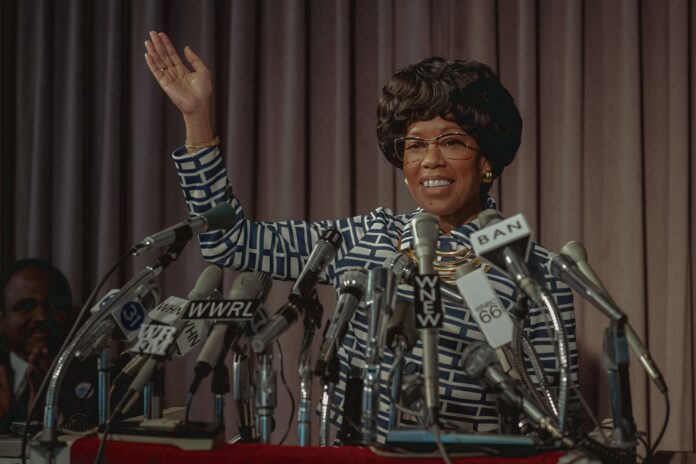
(CNN) — Regina King’s spot-on performance as Shirley Chisholm outshines the movie devoted to the political trailblazer in “Shirley,” a laser-focused look at the first Black congresswoman’s 1972 presidential campaign that might have benefited from more biographical detail and less obsessing about amassing delegates.
Providing only a hasty introduction, writer-director John Ridley (whose recent credits include “Five Days at Memorial”) launches directly into Chisholm’s longshot bid for the White House, repeatedly heeding her own instincts that drove some of her advisers (played, mainly, by the late Lance Reddick, Brian Stokes Mitchell and Terrence Howard) crazy.
Specifically, Chisholm provides detailed responses on hot-button issues like school bussing and abortion, in a way that, even in the pre-Internet era, are too nuanced, she’s told, creating the risk of alienating constituencies she needs to win over.
Mastering Chisholm’s distinct speech pattern, King’s portrayal gradually brings out details regarding the person and not just the candidate, from her strained relationship with her sister (played by King’s real-life sister, Reina King, who produced the project with her) to Chisholm’s frequent irritation with her husband Conrad (Michael Cherrie), who articulates the toll of living in his wife’s shadow by saying, “A shadow of a man is what you want.”
“Shirley” nicely presents the hurdles Chisholm had to overcome, and the rough-and-tumble of a scrappy and underfunded political operation that had to pick its spots in terms of where and how to spend money. There are also savvy exchanges that reflect lingering issues of letting candidates speak their mind as opposed to what will poll best.
Still, the film has stretches that feel as if it’s bogged down in minutia, and too few moments like the one where King ignores her political counselors and chooses to visit avowed segregationist George Wallace (W. Earl Brown), her political opposite, in the hospital after the attempt on his life. The narrow devotion to the ’72 convention also skips some seemingly important details, like the fact that eventual Democratic nominee George McGovern went on to experience a crushing defeat.
Bearing memorial dedications to Reddick and King’s son Ian, “Shirley” joins recent projects like Netflix’s “Rustin” and “On the Basis of Sex” (about Ruth Bader Ginsburg) in celebrating iconic figures that swam against tides of overt racism, bigotry and sexism in helping to carve out trails for those who followed.
The result is a sturdy but unspectacular film, one that honors Chisholm’s place in history while representing just one, too-concentrated facet of her giant shadow.
“Shirley” premieres March 22 on Netflix.
The-CNN-Wire

